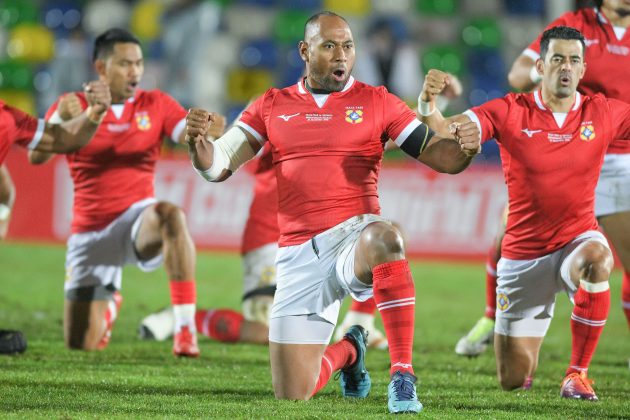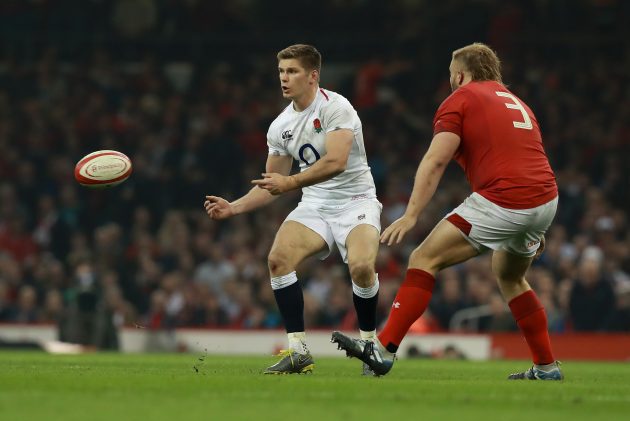Neil Back, a 2003 World Cup winner with England, discusses where the power lies ahead of this year's tournament in Japan and what's needed to achieve success
Neil Back: “Owen Farrell is undoubtedly England’s most valuable player”
Who’s well placed for World Cup glory?
I hope another northern hemisphere team will win it; hopefully England, but if not England, one of the others. I think the upcoming World Cup is going to be the most competitive one yet, certainly from a northern hemisphere point of view due to our world rankings at the moment. We’ve got three teams in the top four.
With my head over heart, New Zealand are the No 1 team in the world. But they’ve got slimmer odds than ever before, with Ireland, Wales and England hot on their heels. The gap has closed. New Zealand are not unbeatable; in fact, they’re very beatable.
New Zealand still remain the No 1 team, albeit Ireland have had some joy with them in recent years. Wales have had an incredible year. It’s whether they can sustain and maintain that winning momentum – they’ve won 14 games on the bounce and are in a good position.

On a roll: Wales have had “an incredible year” and are a powerful northern hemisphere contender (Getty)
England and Ireland are just behind them in third and fourth in the world, and France are another team that can definitely win it. It’s addressing the mentality of moving on to the next game and concentrating on that.
It’s been a different road for the current crop of 2019 to the one in 2003 as we approach the World Cup. We had a good winning run; England haven’t had a good past year but they remain one of the teams that can win it. We’ve got three, possibly four, northern hemisphere contenders that have proved they can do what it takes to win a World Cup, and that’s to win seven games on the bounce. I think it’s probably the first time that’s happened.
Who will light up the tournament?
Owen Farrell is undoubtedly England’s most valuable player. If he wasn’t available we’d have to play differently. Billy Vunipola as well is very important to the way England want to play. There are other players who believe they are in that same class. I think they need to get their heads down, and the people around them need to give them some tough love because they’re not as good as they think they are.

Lynchpin: Billy Vunipola, at a media session in Bristol this week, is crucial to England hopes (Getty)
A lot of the spotlight is on kickers. It is a way of winning games. There’s going to be some unknowns that hit the headlines. I’m a team man and when a squad wins it, it’s not because of one person, it’s because of many. The players, staff and supporters all add a little to the pot, and if you get it right it’s wonderful for everyone.
I think there’ll be more tries scored in this World Cup. The game has changed. Although defence can win games, there is more of an attacking philosophy. Because individual players and teams are so good now, you’re going to get games won by small margins. I think in many of the games, people will express themselves. Attacks have the upper hand now, I believe, so I think we’ll see a lot of tries and some amazing moments.
What about the Japan factor?
Japan will be a new environment and it will probably give Eddie Jones and England a slight edge because of his local knowledge. It’s a minute edge but that could be the difference between winning and not.
Inevitably, when you play in unfamiliar climates or altitude you have to adapt. It is different. You have to prepare for that both physically and mentally. I think that’s one of England’s strengths going into the World Cup.

New venue: Japan will be an unfamiliar environment for many of the players at the World Cup (Getty)
Japan is a new destination for many players. It’s a venue I never went to in a 17-year playing career, so it’s unique. There’s a different culture, different attitudes. It’s not only preparing to play but also preparing to deal with a new environment. One of the advantages we had at the 2003 World Cup was that we had stayed a couple of times at the hotel in Sydney before, so we got used to the destination. It felt comfortable and that’s important.
Any potential slip-ups?
On their day, as Japan proved in the last World Cup beating South Africa, there can be those slip-ups. If you think about the next round you can lose this one. There may well be slip-ups. The tournament has never been won by a team that has lost a pool game – they’ve always gone through having won all seven games. But that could possibly happen at this World Cup.

Red flag: second-tier sides like Tonga will be dangerous if the top teams take liberties with selection (Getty)
The game has moved on. The pace of the game, the duration of time that the ball is in play, has increased, the physicality has increased. You have to have a bit of luck for players to play all seven games, and obviously not everyone is going to play all seven games, so you have to use your squad. And they may use their squad against those second-tier nations, and that could be your undoing.
How do you win a World Cup?
Ultimately, the best route in is if you beat the best teams in the world both home and away on the run into a World Cup.
You don’t win it until you get to the final and the ref blows the whistle at the end, and you’re ahead on the scoreboard. It’s important that as a squad you do everything you can to be the best you can be. And if you don’t do it it’s not because you didn’t try hard enough, it’s because you weren’t good enough – and that’s okay.

Tearaway: Neil Back bursts clear against France during the 2003 World Cup in Australia (Getty)
What the World Cup does give you is unprecedented time together as a national squad. You have a couple of months together, whereas it’s a couple of weeks normally. You’re normally carrying injuries in that two months building up to a World Cup on the back end of a season. but you can usually get over minor injuries.
So you should have the fittest and the healthiest squad that you’ll ever have going into a competition. And that’s why it is going to be tremendously competitive.
We had prepared for all eventualities in the years leading up to the 2003 World Cup. When we went into it the squad felt unbeatable, when you looked around the changing rooms you felt unbeatable. You knew you’d beaten the best sides home and away, and you were on a great ride. There were some very good players that didn’t make the plane.

Mark of champions: the 2003 England squad had unshakeable belief borne from their No 1 ranking (Getty)
It’s got to be good planning. you’ve got to look after yourself. The biggest battle at a World Cup is not looking after yourself physically but mentally. It’s more difficult in the downtime when you’re not training, you’re not active and you’re thinking about what could be. Getting through that is the biggest challenge.
“The biggest battle at a World Cup is not looking after yourself physically but mentally. It’s dealing with time, waiting for the event to arrive”
You think about something else. You find things to do. The planning that went into the 2003 World Cup – the last two weeks, semi-final, final – we didn’t do a lot of time on the field because we weren’t going to de-train in those two weeks. We kept ourselves immaculately fresh, so that meant not a lot of time on the pitch training. So it’s dealing with the time, waiting for the event to arrive.
I was lucky, I had my wife and two kids and my sister-in-law over there. You just had to go out, relax, take some time out with your fellow players, your family and the fans. And enjoy the craic whilst you were there.

Seize the day: Eddie Jones and his England side must make every moment count if they’re to prevail (Getty)
You’ve got to give 100% for the 80 minutes and you need a bit of luck as well. This is the opportunity. If you become world champions it’s a moment that is incredible and will bring you a lot of pleasure and joy going forward. It’s definitely worth the sacrifice and effort.
That’s what I’d be saying to every player: you can’t change what’s happened in the past, but from today going forward you’ve got to do the best you can to be the best you can be. Eddie Jones and these England players will have another opportunity, but let’s seize the moment.
Happy 40th Birthday Wilko @JonnyWilkinson … ?? always a pleasure on & off the field mate ? pic.twitter.com/ohJ8axrAKJ
— Neil Back MBE (@NeilBack) May 25, 2019
I remember back to 2003 with two seconds to go – the ball going between the posts and it’s an iconic moment. But ten seconds later, Trevor Woodman caught the kick-off and secured possession which allowed us to kick the ball off the field. Then you celebrate. That moment was as important as Jonny’s sweet connection to put the ball between the posts.
Neil Back is available as a speaker from Champions Rugby Speakers – click on the link for further information.






